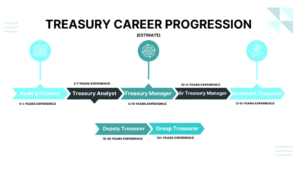Harvey John
Unit 2 Ferry Wharf
Hove Enterprise Centre
Basin Road North
Portslade, East Sussex
BN41 1BD
In the finance world, few positions carry as much influence and responsibility as that of ‘Group Treasurer’. Entrusted with safeguarding an organisation’s financial well-being, group treasurers oversee critical aspects of business operations, including the management of cash, liquidity, risk, and debt financing. Evolving to match C-suite positions, their responsibilities have expanded to align with wider business objectives.
While some may stumble into treasury without prior intention, reaching the zenith of treasury management requires deliberate planning and dedication, as these positions are rare and highly sought after.
Group treasurers wield considerable influence, partnering with executive management to shape group financial strategy and navigate complex financial landscapes.
In this blog, we explore what it takes to reach the pinnacle of treasury management and the skills and strategies required to reach the top of the corporate treasury ladder.
What is the role of a Group Treasurer?
Capital markets and funding, debt, and cash and risk management are primary areas of focus for group treasury, and it’s expected that you have experience and can show competency in most, if not all, of these areas before taking on the position. Career paths can differ depending on company size. Larger corporations typically have structured treasury teams and specific job roles. Smaller organisations may lack a dedicated treasury function, resulting in broader job responsibilities covering various areas of financial management.
Treasury is often wrongly perceived as a numbers game but it’s multi-dimensional and highly interactive. When speaking with the Group Treasurer of S4 Capital, Christof Nelischer, he explained how numbers “show you what is visible and not necessarily what is important.”
It is crucial not to prioritise the figures over other equally important considerations such as business performance and market dynamics.
Christof went on to say how focusing solely on the numbers doesn’t provide you with the full picture,“it is much broader than what is seen through the numbers alone.”
Career progression of a treasury professional
The journey to attaining the role of group treasurer demands foresight and strategic planning. Traditionally, professionals often find their way into treasury through audit or finance roles, gradually progressing through the ranks via different routes over several years.
There is no standardised career path or fast-track option.
Senior-level treasury professionals may have started in entry-level analyst positions, while others may come from different finance disciplines, leveraging their skill sets to transition into treasury.
Each stage of advancement brings increased responsibilities, from tactical, more transaction-focused tasks at junior levels to more strategic decision-making and leadership roles the higher you climb. Salaries* in treasury roles vary based on experience, qualifications, company size, and complexity. Entry-level positions, such as treasury analysts, may offer modest salaries, while group treasurers in multinational corporations earn lucrative compensation packages.
Larger corporations with more extensive and complex treasury activities frequently require their treasury team members to work in more specific roles but offer more vertical mobility over time. Professional qualifications, such as an ACT qualification, are essential for advancement, with further education like a Master’s degree or MBA providing a competitive edge.

The Treasurer’s role involves long-term strategic planning, building bank relations, and implementing operational structures. Senior Treasurers typically stay in their roles longer to oversee projects from start to finish. As Treasurers progress their careers, they need a blend of technical expertise and soft skills such as leadership and communication. Advancement often takes time due to the retention of senior positions. Career progression isn’t solely dependent on individuals themselves; it hinges on the support of management in what is known as succession planning.
Many talk about the importance of mentoring when looking at the bigger picture of one’s career but, as Christof Nelischer outlined to us, succession planning of your team is hugely important.
Christof goes on to tell us that the problem he has with the phrase ‘mentoring’ is that,“it implies you have a coffee and a nice chat once in a while and it is not particularly targeted” whereas succession planning “supports career growth by creating an organised, definitive development plan for progression. It’s much more definitive.”
Why is treasury important?
The path to becoming a group treasurer in UK corporate firms requires dedication, commitment, and strategic skills. With an ever-increasing number of companies realising the value of effective treasury management for both financial stability and growth, aspiring treasury professionals have diverse career options, from large corporations to smaller, growing businesses. Regardless of company size, the Treasury drives strategic decision-making across sectors.
We thank Christof Nelischer for his valuable contributions to this article. Our full conversation uncovering his rise to leadership will be coming soon, so stay tuned.
*Harvey John Treasury are currently conducting a salary survey covering the UK & Europe…Take part today and upon publication, you’ll be one of the first to receive a full breakdown of remunerations when the report is published later this year.
Author
Rachael employs content marketing and research methodologies with the aim of expanding and reinforcing the standing of Harvey John's Treasury team as a prominent and specialized voice within the Treasury and recruitment sectors. This approach serves to effectively communicate our values of expertise and clarity.

